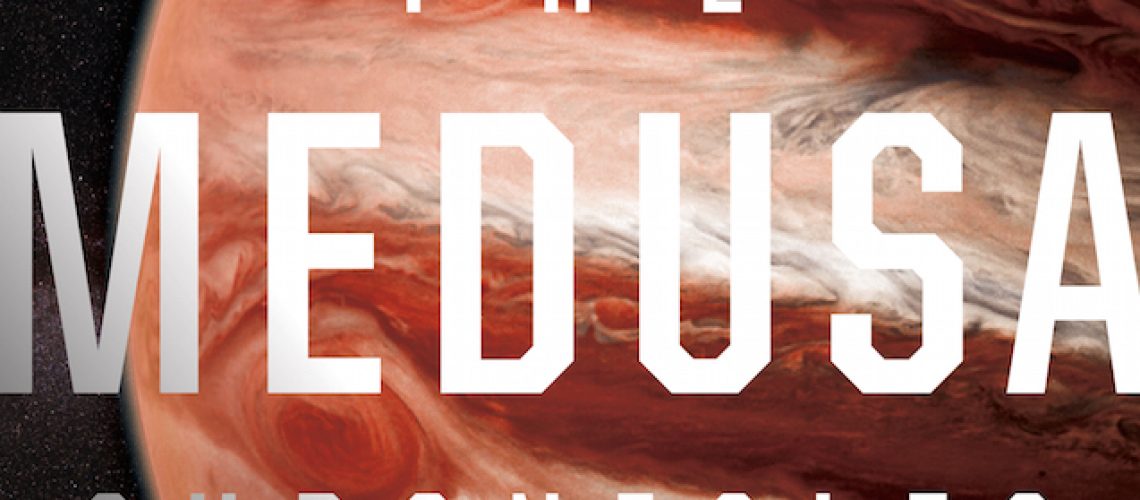Howard Falcon is one of the most interesting characters in the oeuvre of Arthur C. Clarke. The late 21st century test pilot’s crash of an experimental helium-filled airship turns into an opportunity, as his cyborg-like existence mandated in the recovery from the accident makes him the perfect person to do the impossible: make a dive into the upper layers of Jupiter.
The story of Falcon’s dive into Jupiter is in the Nebula award-winning novella “A Meeting with Medusa.” It is a story frequently anthologized, for good reason. Sense of wonder, pathos and inventive worldbuilding make it a classic. Now, with the approval of the Clarke estate, Hard SF authors Stephen Baxter and Alastair Reynolds have teamed up to tell the continued adventures and history of Howard Falcon, and his world, in The Medusa Chronicles.
The Medusa Chronicles runs on a couple of different tracks. The main track is the future history of Falcon himself, after his meeting with the titular Jovian organisms. Being ever more rebuilt into something not quite human, Falcon’s lifespan, or his ability to be mostly shut down and live deep into the future, provides a series of successive stories that run decades and then centuries from the time frame of the original story. The story unfolds as a series of episodes further and further ahead in time. We see his interactions with human polities and the burgeoning artificial intelligence that he helps midwife into existence. Falcon’s loneliness and isolation and separation from humanity, a theme of the original story, becomes a resonant and recurrent theme and central concern of the novel. As Falcon moves forward more and more into the future, the contrast between him and the world around him becomes ever more striking, ever more a brooding concern. In some ways, this novel is a meditation on becoming dissociated with one’s own humanity.
The novel also includes something I did not expect, and that is a 1960s-era plotline that firmly puts the entirety of the novel and its history into an alternate history. This plotline follows Seth Springer, an ancestor of characters that Falcon deals with in his own future. Springer is a NASA astronaut who is called upon to act when it turns out that Icarus, a dinosaur-killer-sized asteroid, is on a collision course with Earth. This plotline starts quickly with that reveal, and consists of the efforts to stop this disaster. Even though a reader knows that this plotline has to be resolved with success enough to save the Earth, it allows both writers to get their NASA geek on, and provides a rational and real approach to how that era of history might have responded to such an existential challenge. While at first I couldn’t see what it brought to the novel, I quickly saw it as a metaphor for Falcon’s story. Several times, Falcon’s own actions, small and seemingly inconsequential, prove to push history onto a new path, just as Springer’s mission is designed to stop a gigantic threat, to push it onto a new path. The plotline reads and runs like a much more scientifically plausible Deep Impact, and allows Stephen Baxter, long familiar with writing alternate-historical NASAs, to once again explore an early history of the space program that wasn’t, winningly described and evoked. I kind of wish this was the timeline we wound up with, instead of our own.
The Medusa Chronicles ends on an extremely high note: a set-piece exploration of Jupiter that is the culmination of everything that has gone on in the novel. It is clearly Baxter and Reynolds’ final love letter to Clarke, especially the absolute wide open and almost beyond imagination ending of 2001. To say more about it would be absolutely spoilery and I really do not wish to deny any reader the unfolding sheer pleasure of reading this capstone of the work. It is some of the most evocative, touching, deep, and well written Hard SF I have yet read, and this sequence alone, sitting atop the rocket of the rest of the novel, sold me on it.
The sensawunda of the protagonists’ trips to and into Jupiter, the expansive sense of deep time that both authors, separately, have brought to their own work melded here, and the inventive and interesting pathos to the main character’s one-way journey into the future minute by minute held my attention from start to finish. For me, The Medusa Chronicles is one of the best books I read in 2016 and is a high candidate for my Hugo Award nomination ballot. I recommend it to anyone remotely interested in the harder end of the science fiction spectrum.








